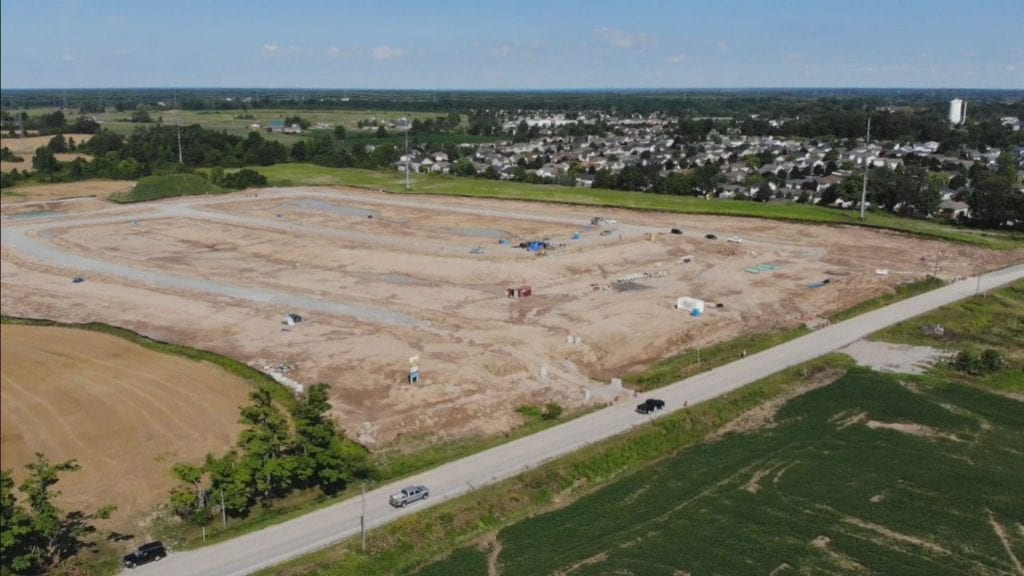
The 25-acre McKenzie Meadows phase one as seen from above in August. Phase two would extend far back to the west of the serviced area (top left of picture). Photo: Steve Mongeau/APTN
The developer of the remaining 83 acres of the proposed McKenzie Meadows subdivision in Caledonia, Ont. says he and his partners are “undecided” about the project’s future after spending more than a decade at the project’s helm and selling phase one to the current developer, Foxgate Developments, in 2015.
For almost four months, Six Nations members have occupied that piece of land, reclaimed it as Haudenosaunee territory and renamed it 1492 Land Back Lane.
“We’re undecided on what we’re going to do with phase two,” said builder Michael Corrado. “But we have no doubt that this land is ours and we are free to develop it if we so choose.”
Corrado and his partners at a numbered company acquired the 107-acre (43-hectare) parcel in 2003. They submitted a draft subdivision plan for phase one that year. The municipality soon approved it.
In 2005, the company received permits from the Ministry of the Environment to construct sewers and water mains. They were almost ready to build.
But that work wouldn’t start for another 15 years. And when it did, it took only months before Six Nations members halted construction.
Not the first time a land occupation stalled the project
When Six Nations people occupied the Douglas Creek Estates subdivision in 2006 and renamed it Kanonhstaton, they didn’t just freeze construction there.
They also forced the developers to put McKenzie Meadows on hold.
“We ticked every box,” said Corrado in a phone interview. “That all changed when the Six Nations walked on to Douglas Creek Estates, and history changed forever.”
Corrado explains that, while phase one fronts McKenzie Road, phase two extends west toward Argyle Street where it intersects with Sixth Line.
“The back end of our land is almost across the street from the Douglas Creek Estates,” he said.
Coming out of Six Nations territory, Sixth Line runs immediately adjacent to Kanonhstaton. An unopened part of the road continues into McKenzie Meadows after it crosses Argyle, as illustrated in the map below.
A support camp has stood at the strategically-important intersection since police raided the land back camp in August. The position is blocked off by barricades that make a second raid extremely difficult.
“Just by geography we were sort of caught because of our proximity to the Douglas Creek Estates and our proximity to the reservation,” he said. “So we decided to put the project on hold, and we started trying to navigate our way through that whole quagmire.”
In 2008, Corrado found himself in the position Foxgate is in now, caught between the Six Nations and the Crown in the centuries-old dispute over land rights along the Grand River.
The Haudenosaunee Development Institute (HDI) blockaded that project in Cayuga, 17 km southeast of Caledonia and 40 km south of Hamilton. The HDI reportedly demanded a $3,000 development fee and asked Corrado to transfer title to HDI then lease the property back from them.
“We went to court, got an injunction and they obeyed it,” said Corrado. “We went through hell during the process.”
Similar events unfolded at the same time in Brantford, the city west of the Six Nations’ current territory. Chiefs, the HDI and supporters defied an injunction and blocked development at several sites through 2009. The city sought and obtained an interlocutory injunction against the protests in 2010.

In 2013, ten years after it was initially approved, Corrado and his partners decided it was again time to start developing McKenzie Meadows phase one.
They hired a lawyer and filed for an “anticipatory” or “pre-emptive” injunction against the elected band council, the traditional chiefs, the HDI and all Six Nations members to try and stop people from interfering with development.
The case proceeded to mediation and negotiation rather than litigation.
The elected council then held a series of community engagement and consultation sessions to gauge support for the development. There was a proposed deal on the table, but only 79 people attended the meetings.
Seventy-one people submitted responses with only 12 supporting the development, according to a final report.
“Comments received from Six Nations members were generally opposed to the development. There was some concern for the resurgent of Douglas Creek, environmental impacts or felt that the benefits being offered were not sufficient,” said the report.
“As a result of questions, comments, views and concerns gathered throughout the engagement process, it is recommended that the Six Nations Elected Council not proceeding [sic] with the development.”
Haudenosaunee say history will be on their side
Skyler Williams, the spokesperson for the McKenzie Meadows occupation, submitted this report as evidence during injunction hearings, along with a December 2013 band council resolution that said council shouldn’t sign the deal.
Williams’s factum recounts this history in support of allegations that the Crown didn’t fulfill its duty to consult with the community.
“In the end we sold the property,” offered Corrado. “We sold that first phase in summer of 2015. We decided just to sell it and let them go in and build.”
“That was a decision we made together,” he explained. “At that point, we thought, you know what? Let these big guys come in. We’re just small players. Let the big boys come in, develop this and that was it. It was pretty simple. Just a business decision.”
Foxgate, a partnership between Losani Homes and Ballantry Homes, modified the 2003 plan and submitted a new one in 2016.
By 2017, Haldimand County had again fully approved the project.

Then in late 2018, the elected council switched positions on the development and authorized Chief Ava Hill to sign an agreement with the new developers so long as the community received an accommodation of land elsewhere.
The parties finalized and inked the deal in 2019. The agreement, also submitted in court, included $4,000 to start another round of community engagement.
“There has been no documentation provided of any form on consultation for this agreement,” alleges Williams in a court filing.
Through the first part of 2020, the developers forged ahead with grading and servicing work. The land occupation began in July.
“As far as they were concerned and we were concerned, everything was good to go,” Corrado stated. “Everything had been resolved, everything had been settled. There was a deal, there was a structure in place.”
William Liske, vice president at Losani and treasurer at Foxgate, told APTN News the same thing in August.
“1535 McKenzie is right next to a mature residential subdivision and doesn’t share any common boundaries with Douglas Creek or Reserve lands,” he said in an email. “That and the fact that a definitive agreement was reached with the Six Nations Elected Council confirmed that there was no anticipated risk for the project.”
But everything is far from settled.
Williams counters in his submissions, which the judge rejected, that Foxgate ought to have been aware of the risk.
Blockades remain in place, roads closed. Various community meetings are scheduled within Six Nations in the coming days, said Williams in an update.
Construction at the site continues, but again not by the developers.
“Buildings are still progressing along. Still lots of work to be had,” said Williams. “But we are all looking forward to being nice and warm this winter.”
Provincial police have arrested 33 people since the occupation started.










